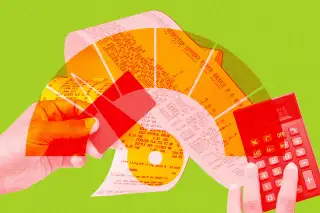The Best (and Worst) Ways to Start Building Credit, According to an Expert

It’s becoming increasingly difficult to navigate life without well-established credit. Our credit histories are factored into all kinds of decisions — from getting approved for a loan, of course, to renting a place to live and even finding affordable car insurance.
Having a bad credit score can prove very costly over time. It could mean you can't get an apartment rental or are rejected for a mortgage — or perhaps you're accepted but the interest rate is very high.
According to the Consumer Financial Protection Bureau, a federal agency tasked with safeguarding consumer finances, about 45 million Americans are “credit invisible,” meaning they either don’t have a credit history at all — or their credit report is too thin to generate a credit score. These people are typically low-income earners or people of color.
Economist Ying Lei Toh, a researcher with the Federal Reserve Bank of Kansas City, says these people have trouble getting credit cards and loans because lenders don’t know much about their creditworthiness. Toh’s research shows this situation is a financially debilitating catch-22 for millions of Americans: To obtain credit, you often must first show that you have a decent credit history.
“Historically, bank account balances and the amount of money you make are not taken into account for credit scoring,” Toh said in an interview with Colorado Public Radio (CPR).
Newer credit-scoring models are cropping up to address this pitfall by taking into account one's income and transaction data, she notes. However, consumer advocates are starting to raise alarms over issues with these credit-scoring models as well.
Starting to build credit from scratch can be difficult. Here’s a look at the best- and worst-case scenarios, according to Toh’s research.
Best way to build credit history
One of the best ways to establish a good credit history is to get some help from someone who already has good credit.
For example, by finding a credit-worthy co-signer, you can secure a loan with an attractive interest rate because the terms will be based on the person with better credit, not yours. All the while, you’ll be able to build up your credit history.
Similarly, another method to build credit is to become an authorized user on someone’s credit card. Essentially, you’ll both share the same credit limit on the card, and the payment history will help (or hurt) both of your credit scores.
Toh refers to these strategies as “piggybacking,” because you’re using someone else’s credit to your advantage.
“Those are ways for somebody who doesn't have credit to get started with their first line of credit and give them a head start,” Toh told CPR.
However, she noted that piggybacking often isn’t an option for people who come from disadvantaged backgrounds — and is one key way the credit system perpetuates inequality.
“Low-income households, and, you know, Black and Hispanic households tend not to have that kind of access to somebody else whom they can ‘piggyback’ on,” she said in the CPR interview.
‘Worst case scenario’ for your credit score
In some cases, having no credit history could be better than having poor credit history, as the interest that lenders charge is likely to be significantly higher for borrowers with lower credit scores, Toh’s research found. For example, a borrower with a FICO score under 580 is likely to be charged an interest rate about 17 percentage points higher than someone with a great credit score of 720 or above.
And in some cases, lenders may be more willing to work with borrowers who have no credit history than people with bad credit history.
“The worst case scenario is where some consumers actually get their credit history started because of negative events such as debt collection or bankruptcies,” Toh told CPR.
Blemishes like these on credit reports can have long-lasting consequences, because they can linger on the reports — and keep credit scores down — for seven years.
“In that case, where consumers start off with these negative events, they are going to have a lower credit score from the get-go,” Toh said in the interview, “and then research has shown that people who start off at a lower score tend to stay in the lower score bucket.”
More on Credit & Credit Repair
Money’s Top Selection Guides for Improving Your Credit
Money’s Credit Repair Companies Reviews |